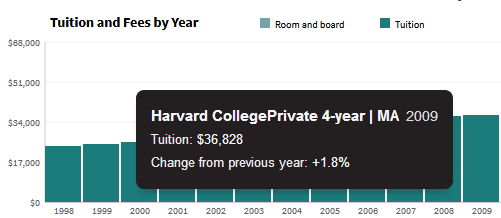
Background
It all began in my childhood. As all boys in kindergarten, I wanted to be a trashman. I didn’t notice it back then, but now, thinking back as an adult, there were unmistakable signs that my family was gently trying to shepherd me towards possibilities which provided a more secure living, so after a while I gave up on the idea. It occurred to me in primary school that I wanted to be a pilot. I love planes and flying, and one of my dad’s hobbies was gliding, so I had the privilege of experiencing the feeling which just enthralled me. During a career-related medical examination when I was thirteen, I was diagnosed with color blindness. It was a giant blow for me, as besides not being able to become an electrician, a bus driver or a butcher, I also couldn’t become a pilot. In the following years, I was without a clear vision. I graduated high school, and I had no idea what to do. I was interested in the environment and the issues of sustainable development that started to gain prominence at the time, so I applied to the country’s first environmental engineer course, which happened to be in my home town, Veszprém. A couple of months later a friend of mine called me that she was intrigued by air traffic control (I had no clue what it was), and she managed to get to see a whole shift, however she had no car, and asked me to drive her to Budapest. I spent the whole day with her at the control tower of Ferihegy airport, where I immediately fell in love with the job, and decided that I must work there. (My friend wasn’t given the job later, and I honestly think it was for the best.)
I looked into it and it turned out that HungaroControl Zrt, a state owned company that has monopoly in Hungary, trains the applicants in a 2-year course after a complex, multi-step selection process. Back then the conditions for applying were preferably an engineering degree, and an intermediate English language exam. I already had the latter, so I decided to finish university and apply for the training immediately. Since they retracted the condition of the degree – in my opinion because there weren’t enough applicants with proper skills (which in the light of the following story could be an interesting issue), I submitted my application during university.
July 23, 2009 – the Big Day
Back then the former CEO hadn’t yet utilized the idea of putting drunk Dutch tourists on ferris wheels and into bumper cars at music festivals as an ingenious and obviously dirt cheap marketing tool for the effective recruitment of air traffic controllers. True, in the meantime there were no 65 or 320 million Forints given to the businesses (Young&Partners, Trinity) of Tibor Kuna who since has fallen from grace, or to the Szövetség a Nemzetért Alapítvány (Association for the Nation Foundation) that belonged to the so-called civic circles to promote the job of air traffic controllers, for instance at the gala of the Palóc Madonnák or the nativity at Hadikfalva.
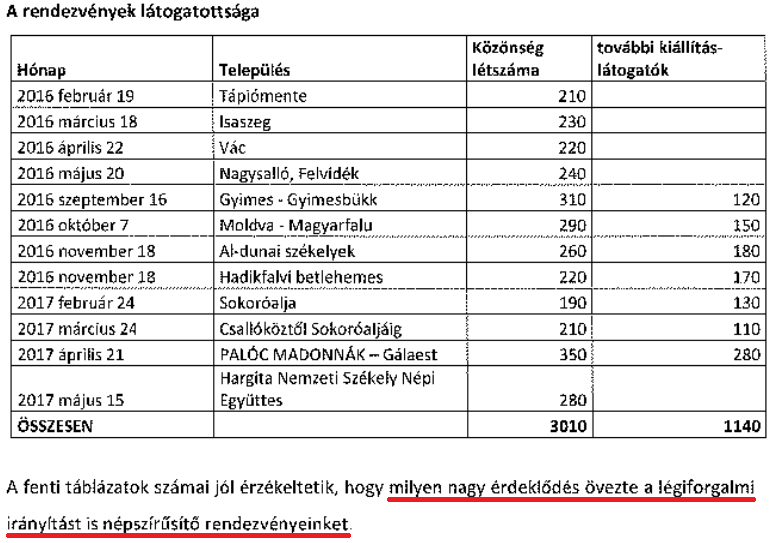
Source: https://demetermarta.hu/dm-hungaro-alapitvany-2/
So as I didn’t have the opportunity then to gain information of the application process and the conditions of the training at such prestigious professional events, all that was left to me was the following website which refused to go into boring details which will be apparent below (such as the 18.8 million Forint fee for the course).

Thus, I’ve sent my application to the provided email address and waited. Soon they reached out and outlined the process of the application, which was a four-step selection process lasting several months. A special computer test designed for controller candidates, a medical fitness test, a psychological evaluation and an interview. Out of about 500 applicants, they selected nine within a couple of months. If I remember correctly, they planned to select twelve, but there weren’t enough suitable applicants. I received an email approximately half a year after my application, on July 23, 2009 that I was accepted.
Dear Gábor Kaszás,
I inform you that we concluded the selection process of the air traffic controller training of 2009. In accordance with our decision, you have gained admittance, and so you can start the course foreseeably on October 5, 2009.
Congratulations!
So they decided that I fulfill the conditions of the selection procedure. This is going to be an important detail later on.
The training
On a Friday on October 2, 2009, I packed up my life in Veszprém into a car and with a relentless smile on my face departed to Budapest, leaving behind my family, friends, and a hobby, which was a band founded by me which was still trying its wings but was already touring the country, so that I could realize my biggest dream: to become an air traffic controller. I spent the weekend trying to make my meager rented apartment more homely, and on Sunday I took the train to try out the commute to the airport, lest there should be problems on the first day.
I had to appear at the headquarters of HungaroControl Zrt. at Igló Street at 8 am on October 5, 2009. Needless to say, I was already sitting at the reception 45 minutes before. At 8:05 I found myself in the room with 8 others, where we spent most time in the next half year. After taking care of some administrative duties, we received two contracts, one for education, one for adult training, so we could review and sign them. There we were surprised by two things, one of which we didn’t factor too seriously despite realizing the austere years that were to come after a quick calculation. It turned out that despite the “fib” on the previously referenced website, the stipend was in fact not a stipend (as legally a stipend is free of tax), so for two years we had to get by with 120,000 Forints a month, gross. This is a net amount of 87,915 Forints. Back then the average wage was 124,100 Forints, net (source: KSH, Central Statistical Office). So as someone from the country, I had to make do with only 70% of the average wage, in a rented apartment, in Budapest. In my free time (which I didn’t have much with all the training and studying at home) I taught English. That is how I survived. I never told anyone but there was a day, when I didn’t have enough money as a student of mine cancelled a lesson for that date, so I had to decide whether to buy sour cream or salt for the spaghetti I cooked. It is interesting to note that at that time in Maastricht, the stipend for controller candidates was 1300/1800/4000 EUR during the different stages of the training.
The other surprise was the fee of the training. Our eyes beheld in bewilderment the
18,864,705 Forints,
a cost, which, according to the next sentence the company naturally bore, in return for which, the graduated students shall work as air traffic controllers for the company. We were youngsters, aged 20-30, and I bet none of us could pay such an amount, so we asked if we could take the contract for a day and show it to a lawyer. We were told that it had to be signed that day, but we could do so at ease, as no one was asked to pay anything back, it was only in the contract so that if people didn’t attend the training or didn’t take it seriously, there were legal consequences. We believed this to be true, as we really wanted to become air traffic controllers, and we believed it, because it had been true, up until my expulsion. Later the then-CEO testified about this at court:
The trainee seriously had to violate the rules for him to be made to pay back the fees of the education as per the contract. For instance, if he was expelled from the training, then he was obliged to repay the fee in case he seriously violated the contract. If there was no proof, or we could not prove that a serious violation had taken place, then the training fees weren’t demanded to be paid back. For example, if a trainee couldn’t handle stress, we suggested that he would not be an air traffic controller, so the lack of skills wasn’t a serious violation of the contract.
Source: Court transcript, October 19. HungaroControl vs Gábor Kaszás (public trial)
In 2009 I could have studied at Harvard from 36 828 US Dollars. At the exchange rate at the time, it cost 8 654 000 Forint, so if I didn’t apply to HungaroControl, I could have saved 2 million Forints during the 2 years. True, that’s only Harvard.
So we signed the contract as we had absolutely no intention not to take the training any way but seriously. This profession is a dedication, or even love. It can’t be perceived simply as a job, and I think all of the world’s air traffic controllers could agree with this.
After a 3-day team building in the country, a 6-month theoretical course followed. Without exaggeration it was world class, with world class instructors. Unfortunately, the same cannot be said of the circa 6-month training in a simulator thereafter. In my opinion, nobody has ever learned to control flight from being shouted at: “what the fuck do you think you’re fucking doing?”. Once, by the way in a very polite manner, I mentioned the rudeness of the tone, and the fact that the simulator training was much more difficult from the beginning, and we got harder tasks than indicated in the curriculum, but it was not mentioned on our report cards. As a reply, the only answer I got from the instructor responsible for the objectionable situation, who frequently overstepped his boundaries, and, although he could not have done so according to his job description, even constantly confronted with the opinion of our instructors, was how I dared question his many years of experience. The management, who then only knew our names at max, only saw on paper, that we were handling easy tasks poorly. After this, the first written assessment contained downright lies: the instructor wrote that by my own admission, ordinarily I’m so anxious that from the beginning to the end of trainings I have butterflies in my stomach. On the one hand, even if it were true, I would have had enough sense not to tell this to the one person who played at making our lives more difficult, but on the other hand it wasn’t even true. Of course I had no right to present my own side in the assessment or disagree with it, and the management received it with this content. With difficulty, I managed to take the exam successfully despite the above mentioned circumstances, and conclude the simulator stage.
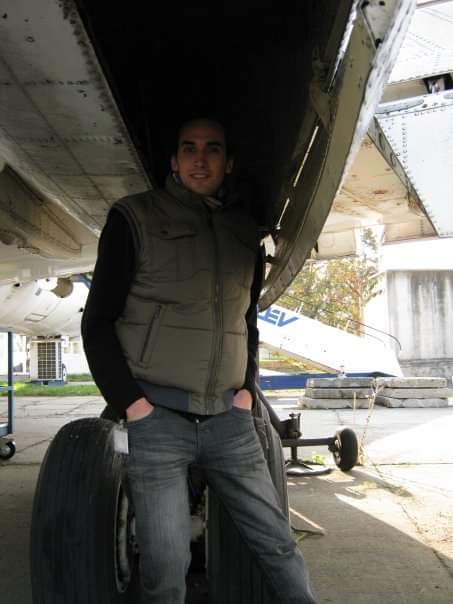
November, 2009
From December 18, 2010, the simulator training was followed by the so called on-the-job (OJT) training. This effectively means real life controlling, with actual aircraft and pilots, with actual passengers with all of them. Air traffic controllers in Hungary work 12-hour shifts, from 7 AM to 7 PM and from 7 PM to 7 AM. A day shift, then a consecutive night shift the next day is followed by a 3-day break. I believe they can spend a maximum of 9 hours working, on average there are 45-90-minute so called sit-ins, which is the actual work before the radar. Between these sit-ins there is break, that’s how a shift is filled out. The schedule of the day is prepared beforehand, so before the shift the controller knows when he has to work. After the simulator stage the negative assessments continued and I was told that no progress or experience was observed in my work. Maybe, I ask sarcastically, is it because there were shifts, when I was allowed to work for only 45 minutes out of the 12 hours? Or because during the 9 months I spent on the on-the-job training, on average I was allowed to work for 3.1 hours out of the 12? I indicated multiple times that I wanted to work more, as with 1-2 work hours a day I couldn’t gain sufficient skills, which I was criticized for. I got promises and excuses, but there was no change. As a comparison, the trainee who got to work the least after me got the chance to work on average 4.5 hours per shift. This is nearly 1.5 times the difference, so during the whole training he had 140 more hours to gain the necessary skills. Nine months passed in this fashion, and I felt that I couldn’t progress under these circumstances, but it was evident from the quality of the trainings and assessments that helping my progress is not an objective. My mounting suspicion finally proved to be true.
Giving notice, HungaroControl style
I was beginning my morning shift on September 19, 2011, when to my surprise I saw that I wasn’t on the schedule. My chief instructor wouldn’t reveal its cause, and told me to busy myself. At around 8:30, the secretary of the head of the department called me on the phone, and told me to go to the methodology department, maybe I could work there. I questioned her in befuddlement, and it turned out she thought I already knew that I wouldn’t be allowed to take an exam, and my training would be discontinued. I went up to the head of the department, who sat me down and told me that I had 300 hours in the training (this is the minimum number prescribed by the authorities), and my training would be discontinued as the instructors were of the opinion that I was not at the expected level, and wouldn’t pass the exam.
Could I have been given more hours? Yes, this is allowed by the rules of the training, as everyone from my group was given extra hours, since nobody took the exam after having only 300. And yes, I know of several cases when a trainee received several extra hours and didn’t pass the exam even then, but at least was given the opportunity. Because:
- the 300 hours doesn’t mean that after that one must be able to pass the exam, but that one can’t take the exam before
- none of my fellows were ready to take the exam at 300 hours, the first to take the exam clocked 340 hours
- one of my fellow trainees failed at the last exam after many more extra hours. This last exam in fact is only a formality, which proves in front of the instructors and representatives of the aviation authority that one can control air traffic. The failed trainee was allowed to retake the exam, and has been working ever since.
To my question, whether there is any chance to revise the decision, I got the answer that I would not become an air traffic controller at HungaroControl Zrt. So it soon became apparent what I was facing. I was presented with a letter, from the head of the department, which among others included the following:
Although Gábor Kaszás did everything to fulfill the criteria (…) he is not up to the standards (…) so (…) we are unwilling to continue his training.
This was followed by a conversation together with the aforementioned head of training and the director of HR. It turned out that despite the long standing practice, under which if someone was not up to the standards regardless of their of selection procedure, they didn’t have to repay anything, moreover usually another position had been offered to them at the company; the new management (after the new government took control in 2010, the old one had been let go) wanted to change this, so I would have to pay back the stipend I had received thus far, which was in the ballpark of 2.5 million Forints. Except, and the story began to turn interesting at this point, if I were to sign a letter, claiming I couldn’t handle stress during work, and I ask to be examined by a doctor, a psychologist designated by them, as then I would receive a document, certifying that due to psychological reasons I was medically unfit to be a controller, and thus I would be exempt from repayment. As a testament to the lack of communication between departments, I got a call a couple of days later from someone at HR, saying that they knew what I was up to, and basically threatened me that if I did this, I would get no other jobs at the company. As the whole procedure was more than suspicious, and as a 29-year-old, I didn’t want a professional certificate stating that I am psychologically unfit for anything regardless of the reality, though I signed the letter (only because there was only one copy and I had it, I would have had to appear at the evaluation with it), I went to a professionally recognized doctor, Dr. Gábor Hardicsay, and asked to be evaluated myself, so that I could get a clear picture of my abilities. He directed me to Kecskemét, to József Hornyik, who among others evaluated the mental fitness of Malév pilots. I did every available test for hours (more and on higher levels than expected at the application exam for air traffic control), and in a 3-page professional opinion, the psychologist stated that my abilities were above average.
So, they made it clear that no matter that they said on the first day when we signed the contract, and no matter the practice that nobody ever was asked to repay the money, even if they didn’t finish the training, I would have to pay back the stipend I had received thus far. It was also mentioned that if I did this, then the total fee of 18.5 million would not be demanded from me. Without legal background and frightened of the almost 20 million cost, I declared that I would repay the 2.3 million in installments. They said that they would create an agreement based on that declaration, and they would contact me. In the meantime I asked for legal support, and got the advice that I shouldn’t sign any agreement on repayment, as if I did, I’d acknowledge that I was rightfully expelled.
They called me a couple of days later, saying that they created the agreement, and I should go in and sign it. I went there on November 15, 2011, and declared that on the advice of my lawyer I wouldn’t sign the agreement with these contents. I got one week to contemplate my decision, and to declare how I would like to settle the situation. I appeared before them on November 22, 2011, exactly one week later, and I stated in writing that I would sign the termination of the contract with mutual consent on the proviso that no repayment would be demanded of me. I asked for and received a transcript of my appearance there from someone at HR, who told me they would contact me. Several months of silence followed. In the meantime over the phone with the secretary of the CEO, I asked for an appointment 3 times with Kornél Szepessy, who had been leading the company for barely a year. I wanted to talk with him in good faith about what was going on at the training of Hungarian air traffic controllers under the management, as I was almost certain that in the short period of time, he couldn’t gain proper insight into what really went on behind the strict rules and regulations, and I thought it would make him rather unhappy if he knew how future air traffic controllers are “trained”. I didn’t get any reply so for the fourth time I tried sending an email. As a reply Kornél Szepessy wrote, that he believes that their Company was fair and equitable with me during the procedure against me, and if I wish to change my behavior and I am willing to pay back the 2.3 million Forints, I shall contact him again. I don’t know if this was the hourly fee of the CEO, or what the relation was between the two things, but it is nonetheless interesting. Apropos, dear Reader! How much would you pay so that your boss should be willing to talk with you?
From a legal standpoint it is an interesting detail that our education contract was for 2 years, and when they told me that I couldn’t continue the training, about 3 weeks remained till the contract expired, so they told me they wouldn’t terminate it, only wait till it expired and wouldn’t renew it (the contracts of my fellow trainees were renewed, so that is how they continued the training). They didn’t let me go and thus I still have my entry pass to this day. Almost 4 months later, on January 24, 2012 I received a letter, in which they terminated my contract which expired months before, on the pretext that I didn’t finish the training, the training in which they wouldn’t let me take the final exam, so I violated the contract, and they sent me a demand note for 18,284,155 Forints, due within 15 days.
Kafka would nod in approval
I didn’t pay. I think that if a company deems me fit for their training during their own vetting process (while out of 500 applicants they deem 491 unfit), then decided without any chance of revision that the company deems me unfit, then they would have to face the financial consequences of their previous decision, which, must have been erroneous. The training which took 2 years from my life gave me skills I can’t use anywhere else, moreover even though I passed all exams, they wouldn’t let me take the final one. I threw away 2 years of my life, giving up my studies, my life in Veszprém, I lived off a shoestring budget to realize my dreams, only to be demanded to repay at first 2.3 million then 18.8 million Forints.
As a reply to their aforementioned demand note and termination of contract (again: they tried to terminate a contract which expired 3 months before) I declared that I was unable to interpret the termination, as there was nothing to terminate. I also stated that in my opinion I was not guilty of the dire violation of contract, they mentioned in the letter, as I didn’t finish the training (according to HungaroControl I violated the contract with this) because they wouldn’t let me take the exam.
As a reply they went to court. The gist of their claim is this: I didn’t finish the training and with that I violated the contract. I didn’t fail the exam, but based on the assessment of the instructors “I can’t handle stress, and I am anxious during work”. This was their opinion. And as there is no authority in Hungary that could oversee the professional work of air traffic controllers, if the instructors deem you overly nervous, then your career is over before it started without any legal remedies. And if they so decide, then you violated the contract, and they sue you. Even if they misrepresent the truth, and you can prove it. Unfortunately, the court wouldn’t be bothered to solve these paradoxes.
An example of some of these under oath:
1) The legal representative of HungaroControl: “…the defendant didn’t appear at the appointment…”
I have a signed transcript that I appeared, which the court received but didn’t take into account.
2) I objected that HungaroControl didn’t abide by their own rules of training, and didn’t complete the mandatory assessments. These short written assessments that should be made after the so called sit-ins, were made only 3-4 times during the 306 hours I achieved. It is also mandatory to create a longer, written assessment after every 50 hours. They failed to do this after both 250 and 300 hours. It is made apparent by the court transcript below, that neither the instructors, nor the head of the department know the rules of the training:
Head of department: “trainees’ journal, as I said it before, serves for the trainee to note the necessary and important things, and the oral assessments after the sit-ins“
Instructor: “The trainees’ journal has to be managed by the trainee (…) a trainee can take notes in it.”
then later on:
“the trainee can’t take notes in the training journal (…) only the instructor can write in it. As a reply to the question of the judge I can reveal that it is not mandatory for the instructor to write anything under the notes section”
As opposed to this, the truth is (excerpts from the training rules of HungaroControl):
| The OJTI (On-the-Job Training Instructor) responsible for the training, is obliged to fill out the appropriate page of the on-the-job-training journal after every training period, in which the instructor details in writing the content of the oral assessment, together with the total number of hours. |
3) Head of HR: “during the period which is the concern of the lawsuit, the contract stipulated that whoever ceases to be under the legal state as a trainee, and ceases to be trained that person is obliged to pay back the total cost of the training.”
As opposed to this, the wording of the contract: “…can demand the repayment of the fee equal to the actual sum provided as a stipend”
4) We made a counterclaim, as in our opinion before my presumed violation of the contract, HungaroControl had already violated the contract, so the claim of the company should have been denied by the court, as before the expiration of the contract the company hadn’t paid a part of my stipend.
The legal representative of HungaroControl: “The plaintiff paid this”
It is proven that this is not true. The court solved this by saying it is not a problem that they didn’t pay as I would have to repay this sum as well anyhow.
As they discontinued my training on the account of my not being able to handle stress while working, and they sued me later because I didn’t finish the training, I provided the court with the previously mentioned professional opinion of the psychologist, which the court dismissed as they did not deem it an “independent” opinion. For this I asked the court repeatedly to designate a medical expert to assess whether I had problems handling stress. This, however, the court “didn’t deem justified”, as in their opinion, I wasn’t removed based on medical reasons. I don’t know what handling stress is if not a medical reason, but I know that both positive and negative assessments would have benefited me. As if I am found unfit, then I wouldn’t have to pay as per the contract, and if I had no such problems, then the opinion of the instructors at HungaroControl wouldn’t stand.
Another of my faults, as mentioned before, is that they didn’t see the experience and progress in my work (with 45 minutes on the job per shift). My question to one of my instructors:
“I ask the witness if he remembers that in May and June of 2011 I was asking to be given more work time.”
His response: “Yes this is so. As far as I can recall, the defendant turned to me with this maybe twice.”
The chief instructor to the same question: “To the question, whether I remember any extraordinary circumstance with regards to the training of the defendant, I state that the defendant complained that the number of sit-ins and the workload is inadequate, we talked about this.”
Despite all this, for months, till my expulsion, no changes were made.
These instances serve to show how the court behaved in my case. I can mention many similar examples, because of which we made a complaint of partiality, and asked for a change of judge, which obviously didn’t happen.
A couple of details on the circumstances of getting the contract signed as mentioned before: (the witness is the employee who presented us with the contract on the very first day.)
“I ask the witness if she remembers saying anything to the effect during the announcements, that previously nobody was demanded to pay back the training fee.”
“Yes, this I mentioned that previously nobody was demanded to pay it back. (…) Before 2009 there were people who didn’t get the proper license, didn’t pass the training criteria, but they weren’t required to repay the fee (…) there were cases when the contract was voided on mutual consent, (…) and it didn’t stipulate repayment.”
It was thus acknowledged it was the practice during my training not to demand repayment from anyone, so we signed the contract with this in mind. The testimony of the CEO who held his position during my application: “… I state that during my time such demand repayment did not occur.”
But to my misfortune “…a new CEO was employed by the plaintiff, who interpreted this [the contract – the editor] differently.” this was said by the legal representative of HungaroControl. They reasoned that due to the stricter oversight of the public funds, they couldn’t proceed in accordance with the previous practice. (At one stage during the trial, they stated that all of the revenues of the company come from airlines.) This, from HungaroControl, which, according to the aforementioned statements, spends a lot on marketing and recruitment, while the currently active air traffic controllers only managed to force them to settle the anomalies in their work environment and schedule with a cautionary strike. Typical to the conduct of the management, after the agreement they filed a lawsuit against the union who started the strike, which they lost at the court of appeals.
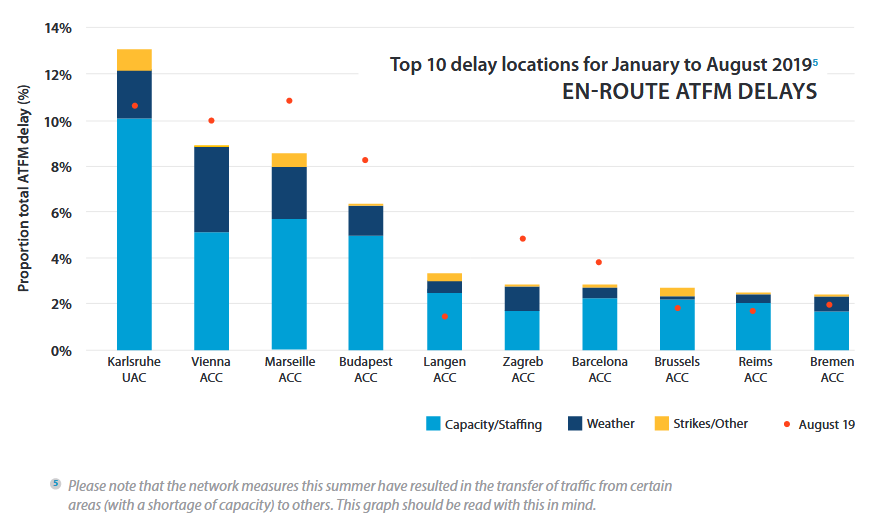
Source: EUROCONTROL
Finally a quote from the transcript of the testimony of my chief instructor:
It can be said with regards to the defendant that he was professionally prepared, (…) studied and learned everything.
Despite this, the final verdict of the court was the following: “…the training of the defendant was provided by the plaintiff in full accordance of and adherence to the 17/2008. (IV. 30) GKM. directive and the training curriculum issued based on this, and the instructors in the training aspired to teach skills, do the assessment, and evaluate the performance professionally, without bias.”
I find myself asking why the court disregarded crucial evidence? Why did it accept obvious and proven lies as facts? And finally: how many people would apply for the training of HungaroControl, struggling with shortage of labor, knowing that this could happen to them?
The ruling and my future
I do not doubt that I am not suitable for being an air traffic controller. This was my dream, but I conceded, and I like my current job. However, I disagree that a company can ruin the life of a young adult, because according to their own subjective opinion, they won’t employ him. The head of HR stated the following: “We launch such trainings annually. (…) the plaintiff obviously doesn’t aspire to burden trainings and their conclusions with such lawsuits.”
These sentences are a bit weird given that for the training after mine for instance 15 trainees were admitted, and out of these 10 were expelled, and from several of them they demanded repayment. However, I have a tape in my possession on which the HR employee at the time admits that when they admitted the 15 trainees, and made them sign the contract of a much higher fee of 45 million Forints, they already knew that they only needed 5 people at the end of the training. So according to the statement of the HR employee, the expulsion of the 10 trainees was effectively premeditated.
The newspaper of the company, HCRadar published an article on the matter in October 2013:
In the meantime a tape recording was also made public, from which HC Radar found out that it had been taped by one of the expelled trainees during a private discussion with an HR employee. On the tape the HR employee makes statements and promises which the leadership of HC knew nothing of, gave no authority to make, and thus the company distances itself from these statements. The management of HC deems both the secret recoding and its content shocking, and so it launched an internal investigation with regards to the case.
We also learned that one of the expelled trainees from the ‘EPC 9’ training group demanded 80 million forints worth in damages due to what had happened. The author of this article asks the question: what would happen if all failed students demanded tens of millions of Forints from their universities? Obviously it would be a booming business to be an expelled student. But does a medical student conduct himself the same way against the university, if he is not up to the professional standards at an anatomy exam? Or is this just a local peculiarity? At any rate, here as well as there, it is “only” human lives that are at stake….
I can imagine the HR employee only dreamed what was said on the tape, and the statements there are unfounded. The questions that occurred to the author of the article incited some questions of my own: what would happen if universities expelled students without any chance of review, and then demanded tens of millions from them? Obviously it would be a booming business to operate a university. But how many would apply then?
Lawsuits also started from this group, regarding amounts of 2-3 million Forints (interesting that the aforementioned tape did not excite the court), however, I am at a special position, as admitted by HungaroControl: “…the legal representative of the plaintiff has already stated (…) that it was only the defendant on which the training fee was also demanded by the plaintiff, no such situation occurred either before the training of the defendant or after.”
According to this, wasn’t the responsible management of public funds paramount in all cases?
Thus today, by November 2019, Gábor Kaszás is the only person in the country, (despite the fact that the relevant sections of the contracts signed in following years is almost the same) from whom HungaroControl Zrt. demands the total fee of the training and its interests to 8 years back, as well as the cost of the lawsuit.
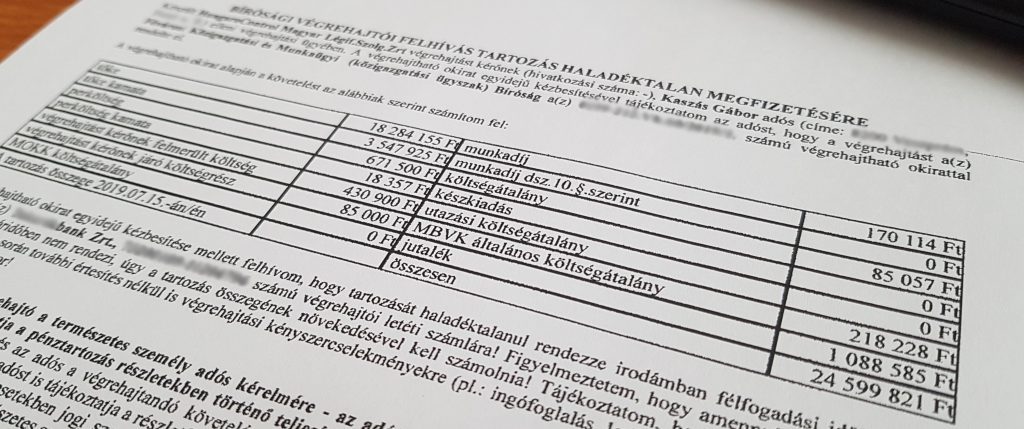
The demand was transferred to a bailiff, who ten years to the day after I got to learn I was selected for the training, put my account into collection for the whole amount. This sum is continuously carrying interest, as such, at the time when my account was put into collection, on July 23, 2019, the sum was
24.714.490 Forints.
Since the collection wasn’t successful as I don’t have such a huge amount, not even the tenth of it, two months ago they started to take one third of my salary, which, in this pace, would last 15-20 years.
With this demand and ruling, they ruined and took my future. I will have to work till the end of my life to pay back the cost which I owe, because a Hungarian state owned company deems me unfit for a career, which they originally found me suitable for, and for which they selected me out of several hundred people. I can’t have savings, possessions, I can’t have a home of my own, and I can’t have a life. The training took 2 years from my life. Another 7 years were ruined by the trials. And now they took my future.
I have only one option left, and this is what they forced me to do: ask people for the help. To spread the news, how it all works in 2019, in the Hungary of Europe, so maybe with the united voice and will of the people, changes can be made, even if that couldn’t be achieved by legal means, and to get my plea for every reader who could contribute with a smaller or larger donation so that I can pay the tens of millions demanded by HungaroControl, to get my life back.
This is a huge amount for one person, for me, in my situation, but if let’s say 8,500 people donated 10 US dollars, it would amount to the almost 25 million. 8,500 people. Will you be one of them?
If you can, please help here!
Thank you!

